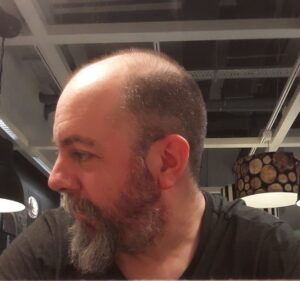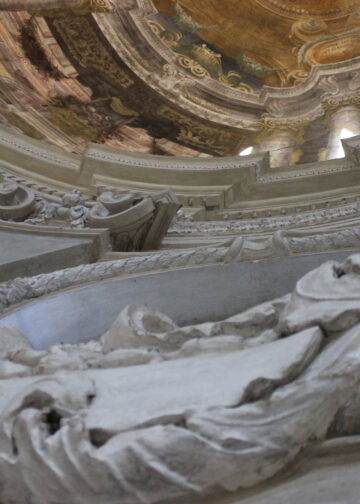From Neil P. Doherty’s Project, see selection from imagined poet Maryam Boyaciyan and The Story, both in issue n. 13 of The Dreaming Machine.
Cover art by Hans van der Ham, Sacrifice.
Nedim Baruh
Loan Word
From a mere loan word
Harsh on the lips
I created you, oh, oh
The mud was warm
And the blood icy cold
But after I swore and sang
And drunk deeply of my guilt
I spat the word out
In a single breath
Then sat back to watch you take those first steps.
Trap
Is it to trap me
You were sent?
Poised like a salmon
In the coldest water
She spoke spat
Flattened the cushion
That had held
The hairs of her head
These five years past
My love
& here I arched my back like a hawk
in flight
You hardly think that I braved
The hoar & the rime’s
Savage bite
Just to set a mere trap
That any mortal could
Spring
No child,
My talons troubling my soft skin,
It was for something worth the sing
That I was sent.
Fall into Sleep
Not a sound round the house
But bees troubling the tap
And the breeze through windows
Open to summer’s embrace
From the stone jug left
In the kitchen’s dry cool, the last drops
Of fig stained milk spilt
To tempt the lips of Morpheus himself?
While I who limped on quiet feet
Each road that spoke of your gate
I stand now rigid in the trees
Waiting to float my one my only note
And tumble hoar tipped skin and all
Right down in the depth of your sleep.
Through what’s left of the street
(-a sliver)
through what’s left of the street
to the star asleep
in the court of our love
two horses pull a cart
one hidden by the dark
– ears all sweaty,
& pinned back-
the other, a drum
unsteady round its feet
beats out a fierce tattoo
through what’s left of the street.
Circumlocutions
It is now somewhat shameful to speak
of those big, fine looking men
who haunted on their light feet
the draughts of our childhood
so quaint in the automobiles
till begged to speak
& they did you know
in the most refined of circum-
locutions
& metaphors which do not sit easily
now on our impoverished tongues
It is now somewhat shameful to recall
how they’d stand by a drawing room door
called to pour the weak tea
then ushered back into quiet
a dark streak by the flaking
paint on our walls
It is now somewhat shameful to admit
that write as we do of home,
of exile & the pain of learning to walk again
not one of us saw fit
to tell them
that their day
was done
Hate
Not for a second,
Did I ever let you breathe in me
I’d take your paltry works of winter
Pitch them headfirst into the stove
And bask in the warmth that only
Hate can bestow.
Not for a second,
Did I ever let you walk barefoot
Through the corridors of my summers
I’d stop you at the gate & send you back for bread
Through cow parsley lanes
And the stench of hate.
Not for a second
Did I ever ask to listen to your verse
Of second hand lust and time worn cliché
For fear that when you stepped down to declaim
The voice that would come back to me
Was the one I’d fashioned for myself
From the leavings of simple hate.
.
Biographic notes of Nedim Baruh
All I will add is that I dislike brilliantine, never had anything to do with the greeting card business and certainly never posed as the Sultan of this realm. Whoever claims that I did has simply slandered me. Now that the editor seems to have disappeared I want to make a few things clear. This act of bringing us together as representatives of something that never existed smacks of mendacity. Yes, we dwelled in the cities of the new republic and wrote poems, some good, some bad and many more that were merely unremarkable, but our hands were turned to many other things: to work, love, children and to maintaining a sense of dignity in a land that did not always want us. Yes, we all drew breath at one point in our common human history. Of that have no doubt. Oh, you might think that none of us here really did and that were are all products of this editor’s poor imagination, or worse, that we are masks for his inability to grace the world with his own original work. No, none of this is true. I was born in 1889 in Kadıköy or Khalkedon as the ancients called it, of a relatively prosperous family who owned a series of music shops throughout the Polis. We sold pianos to the emerging middle class, we sold sheet music to myopic music teachers who spoke French with a strong Italian accent, we sold tanbur, ney and kanun to hesitant second sons and independent- minded daughters, we sold phonographic records to spinsters who demanded to listen to them before they parted with their money. We saw snooty noses cocked at quarter-tones, we saw gullible girls lost in the bland choruses of some cheap operetta, we saw the city split into camps that, while they have moved about, have yet to sit down at the one table and work out how to live together. Did I include this in my poetry? No, I certainly did not, caught up as I was in the currents and drifts of the changes that engulfed us in those years. I took refuge in love and serenade and the softer tones of chamber music. The wails and cries of the crowds outside remained just where they were: outside. Does that render every word I wrote obsolete? I think that it doesn’t. You have the record of one who lived but who preferred, perhaps, not to see. Can art not soothe; cannot it not provide a harbour of peace in times of great uncertainty? Greater artists than us spent their entire writing lives chasing after the echo of one single word: huzur; the inner peace that comes when everything is in place, when everything is as it should be. But bear in mind how difficult it is to define something a slippery as this. Sic transit gloria, it passed without ever being on nodding terms with glory or her attendant handmaids.
It does seem the editor has absconded, perhaps his shyness got the better of him again. Perhaps it’s for the best if I pull down the shutters and let us all ramble off through the night.

Neil P. Doherty is a translator, born in Dublin, Ireland in 1972 who has resided in Istanbul since 1995. He currently teaches in Bilgi University. He is a freelance translator of both Turkish and Irish poetry. In 2017 he was one of the editors of Turkish Poetry Today, which was published in the U.K by Red Hand Books. His translations have appeared in Poetry Wales, The Dreaming Machine, The Honest Ulsterman, Turkish Poetry Today, Arter (İstanbul), Advaitam Speaks, The Seattle Star, The Antonym, The Enchanting Verses and The Berlin Quarterly. He is currently working on volumes of poetry by Gonca Özmen and Behçet Necatigil.





















































